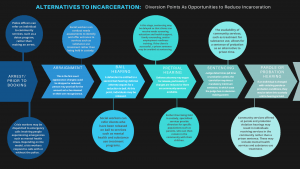Our work looks at the kinds of supports that help women avoid involvement with the criminal legal system; policies and programs that divert women away from the path to prison; and alternative solutions for women who may be sentenced to a correctional institution in Massachusetts.
Studies show that community-based and practical support for secure housing, family unification, facilitation of relationships within the wider community, meaningful work, accessible and culturally appropriate health and substance use services and harm reduction programs help women avoid incarceration.
Alternatives to incarceration (ATI) include a broad array of practices, policies and programs including home supervision (e.g. electronic monitoring), restorative justice, treatment programs, drug and other specialty courts, justice reinvestment in communities, supportive housing, community service, and periodic detention. Some of these alternatives aim to reduce incarceration through expanding use of parole and other diversion practices under the auspices of the criminal legal system. Others aim to reduce the size and reach of the criminal legal system by supporting healthy communities and helping people resolve problems in non-adversarial ways.
Alternatives to incarceration make social, humanitarian and fiscal sense.
- Incarceration is ineffective in terms of rehabilitation.
- Incarceration is harmful to women, their families and communities.
- Incarceration disproportionately impacts communities of color and low-income families communities.
- Incarceration is costly – $162,260 per woman at MCI-Framingham in FY 2020 according to the MA DOC. Studies show that supportive housing in the community costs a fraction of that amount and helps keep people out of jail.
Our review of the statutes:
Even within the constraints of current statutes, many women can be diverted from jails and prisons.


